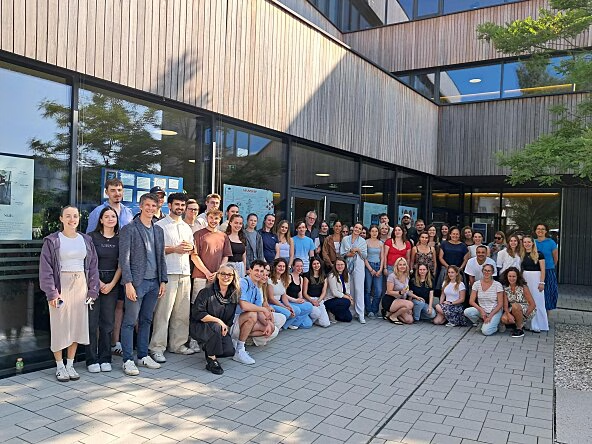The future workshop “Money and Green Finance” took place at the Wieselburg campus of the University of Applied Sciences Wiener Neustadt.

© FHWN
For an intensive day at the Wieselburg campus of the Wiener Neustadt University of Applied Sciences, everything revolved around the future of money – with a clear focus on sustainable forms of financing. The "Money and Green Finance" future workshop offered students and interested parties practical insights into the world of the "green" capital market and concluded with a fascinating panel discussion in the evening.
What actually happens to the money we have in the bank? Is it invested in renewable energies – or does it flow indirectly into companies that build gas pipelines or continue to rely on coal-fired power? This question doesn't just concern large investors or banks. Because money has an impact – regardless of whether it's invested or sitting in an account. You can decide which projects you actively support with your investments or which the bank supports with your money. This is where the future workshop "Money and Green Finance" came in, which took place at the Wieselburg campus of the University of Applied Sciences Wiener Neustadt.
"We need to demystify the topic of money—especially in the context of sustainability. If students understand how financial markets work and the power they have with their financial decisions, then they can become true designers of a sustainable economic system," explains Lisa Muhr, research associate at the Institute for Sustainability and initiator of the event.
Students help shape the future
At the beginning, students from the "Product Marketing and Project Management" and "Green Marketing and Sustainability Communication" programs received in-depth insights into topics such as capital markets, money creation, corporate finance, ESG criteria, and green investment strategies. Introductory lectures by FHWN faculty members laid the groundwork for in-depth project work.
In groups, the students developed solutions to current challenges in sustainable finance – from green microcredits to alternative investment opportunities. The afternoon presentations demonstrated that sustainable financial knowledge is in demand – and young people want to play an active role in shaping it.
Panel discussion: Sustainable investing works
During the public panel discussion, renowned experts discussed the opportunities and challenges of green finance. Reinhard Friesenbichler, an expert in sustainable investment and founder of the consulting agency rfu research, emphasized that capital markets determine which projects receive funding – and under what conditions. Sustainable investment attempts to integrate ecological and social responsibility as central decision-making criteria into these processes.
Madeleine Serlath, founder of the platform geld-kopf-bauch.at, primarily supports women on their path to greater financial independence through conscious financial decisions. In Wieselburg, she addressed the audience directly: "Even with small amounts, you can help shape the future – for yourself and for our livelihoods. Because investing your own money sustainably doesn't mean knowing everything or being 100% perfect. It means taking the first step."
Lisa Muhr and Stefan Grohs-Müller, program directors of the Bachelor's program "Product Marketing and Project Management," also contributed their expertise to the discussion. Together with the external guests, a multifaceted exchange emerged that demonstrated that financial decisions are always decisions about the future – for society, the environment, and the economy alike.
The University of Applied Sciences Wiener Neustadt, Wieselburg Campus
The University of Applied Sciences Wiener Neustadt is one of the country's top educational institutions and a pioneer and role model in the domestic university of applied sciences sector. Through practice-oriented training, international networking, and innovative research, it educates sought-after individuals. The University of Applied Sciences Wiener Neustadt currently offers a total of 47 degree programs at its five faculties of Business, Technology, Health, Sports, and Security at its five locations in Wiener Neustadt, Wieselburg, Tulln, Vienna, and Salzburg. This opens up a wide range of career prospects for its more than 4,500 students. More than 500 employees and around 1,000 instructors ensure the high practical relevance of the education and a modern and efficient teaching environment. The Wieselburg campus sees itself as a hotspot for sustainability and sustainable innovation, as well as marketing and consumer science. With 20 years of market and research experience in the promising fields of renewable energies, the circular economy, food science, and market and consumer research, the Wieselburg campus is one of the country's leading competence centers. Teaching and research in all specializations are guided by the guiding principles of practical relevance, interdisciplinarity, and sustainability. With the newly established Institute for Sustainability, the Wieselburg campus is setting a further example of groundbreaking skills development. The Francisco Josephinum campus in Wieselburg also optimally combines innovation, digitalization, and agriculture, offering the unique Bachelor's program in Agricultural Technology & Digital Farming in Austria.
